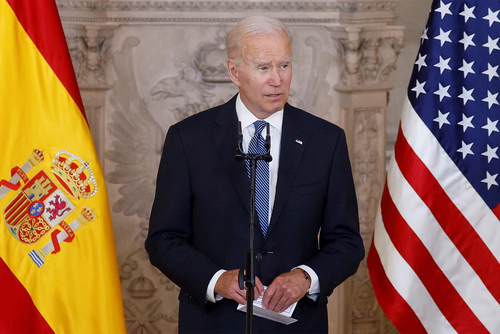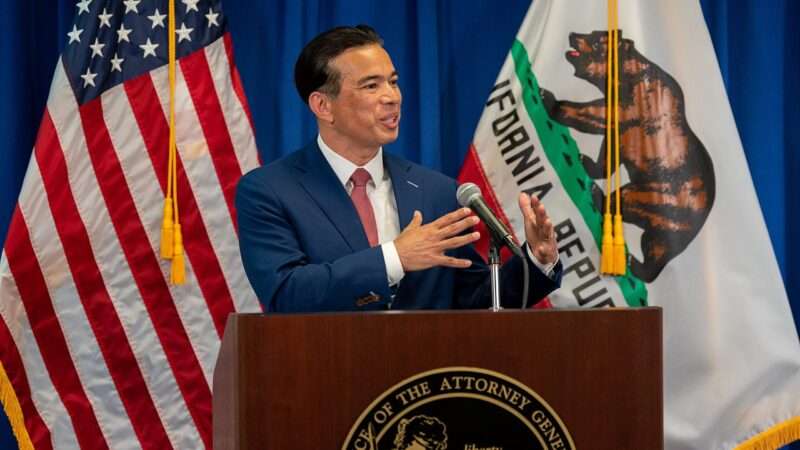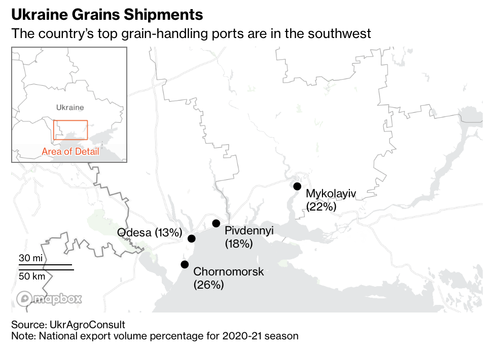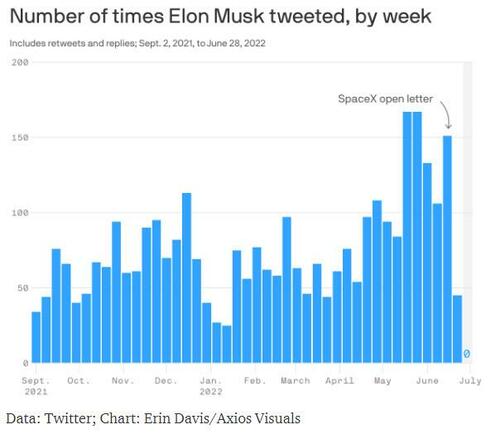By Michael Every of Rabobank
I-Bear-Ian
Apart from a downwards revision to Q1 GDP that made an already bad number look really ugly, most of yesterday’s main action took place in Iberia: and everything there was even worse. As a result, markets are truly I-Bear-ian.
After the Fed’s Mester (in the US) stated policy tightening was only getting started, is likely to mean 75bps in July, getting to 3-3.5% Fed Funds by year end, and to over 4% by early 2023, we also got the usual collection of central-bank warblers-in-chief in Sintra, Portugal.
Powell stated the global economy is in a “new world”, which is something this Daily has been trying to tell people like him for a long time. He also admitted, “We understand how little we understand inflation,” which is something covered here recently. He underlined fears that inflation will stay above 2% for a long time as we transition into a higher inflation regime, and that his job “is literally to prevent that from happening. And we will prevent that from happening.”
That appears to be a response to Mohamed El-Erian warning of the dangers of the Fed doing something the market is not considering: cutting –which the market is pricing in, and ever sooner– and then having to *hike* rates again. Indeed, either the Fed don’t understand how little they understand about inflation, and a deflationary crash looms – Powell was closer to admitting a recession lies ahead; or the market doesn’t understand how little they understand about inflation, and after deflation, a further wave of inflation returns, as during previous high inflation regimes.
Once retailers have slashed inventory at fire-sale prices they have to restock. Those goods are going to cost much more due to the commodity price increase we are already seeing, despite the drop from the peak in most of them. Cut rates now and watch commodities go straight back up again. For now the focus is on the euphemism of ‘demand destruction’, meaning missing out, going hungry, or risking death by starvation: the mildest version is US citizens driving less, or, alongside warnings of July 4 airport chaos to match that in Europe, flying less. Yet in time the focus might shift back to the structural inflation built into this “new world”.
For example, few in Sintra are following the geopolitical angle properly. Russia just said it is considering buying the FX of “friendly countries” to alleviate upwards pressure on RUB, which due to a collapse in imports and high commodity prices is very strong, albeit in virtually non-existent USD- and EUR- cross markets. On crosses nobody looks at now but soon may, CNY/RUB has gone from around 12 to 24 to 8 this year, and RUB/INR from 1.0 to 0.50 to 1.5. That doesn’t mean Russia is ‘strong’, but it does mean the West is weak; and that a friend/foe FX dynamic is playing out. Indeed, Reuters reports an Indian firm is buying Russian coal and paying in CNY to avoid the US dollar, something unseen in 25 years. It may be just one case: but is it ‘monkeypox’ or ‘Covid’?
In short, the Fed has more work to do, and pain to cause, to keep the dollar top dog vs. rising commodities and rivals. Cutting rates might boost global dollar liquidity, but not geopolitics. As such, the US is geostrategically better off hiking until things break in the Eurodollar space, and then offering swap lines only to friends.
Which takes us back to Sintra again. There, the ECB’s Lagarde didn’t understand how little she understands about inflation or what is about to happen in the Eurodollar space. As Spanish CPI hit 10% and Germany’s only dipped to 7.6% due to subsidies that last three months, Lagarde admitted a low inflation environment is unlikely to return, and the post-Covid and Ukraine world “is going to change the framework and the scenario in which we operate.” That means changing the ECB’s interest rates too: which is going to hurt a lot. Especially when Lagarde added states shouldn’t hand out broad fiscal stimulus to cushion inflationary blows, and another ECB voice implied the more fiscal stimulus seen, the more hawkish monetary policy will have to be.
We also got hints about the ECB’s new anti-fragmentation tool (AFT) about to go live. Yet our ECB team conclude AFT “can only disappoint. The announcement in July could be pretty empty if the ECB wants to maintain as much ambiguity as we expect.” Moreover, it implies a flatter curve because “If the ECB manages to strike the right balance, this probably enables more rate hikes, shifting the short-end of the curve higher. If the AFT disappoints, renewed safe-haven demand should depress long-dated yields.” (See here for more.)
You think that was all I-Bear-ian? It gets worse. In Madrid, the NATO summit saw the US announce a massive permanent increase in its military deployment to Europe, from Spain and the UK to Romania and the Baltics. Europe, for all of the talk of re-arming, is still mostly doing the catering – and Ukraine’s President Zelenskiy also stated he needs $5bn a month to keep the lights on and the war going. Much, MUCH more needs to be spent, by Europe, on arms – NOW. The 2% of GDP NATO target was designed for a fully-functioning military during peacetime, not a paper tiger during wartime. Yet isn’t that fiscal stimulus, and so higher rates?
With economies slumping, money tight, and people deeply unhappy, it’s the political cliché the neoliberal/Bloombergian/QE generation of market participants have never even heard of: “guns or butter”. How do you tell your people you need guns when they can’t afford butter? Perhaps by telling them they will never be able to afford butter again if they don’t have guns. But let’s see Europe try to do that: and we will all see what happens to them in time if they can’t. One thing is for sure: more things are going to have to change in this “new world” than rates.
And it gets far worse than that. NATO’s updated Strategy Concept says:
“The Euro-Atlantic area is not at peace. The Russian Federation has violated the norms and principles that contributed to a stable and predictable European security order. We cannot discount the possibility of an attack against Allies’ sovereignty and territorial integrity. Strategic competition, pervasive instability and recurrent shocks define our broader security environment. The threats we face are global and interconnected.”
Is that message clear enough for markets?
Russia “is the most significant and direct threat to Allies’ security and to peace and stability in the Euro-Atlantic area. It seeks to establish spheres of influence and direct control through coercion, subversion, aggression and annexation. It uses conventional, cyber and hybrid means against us and our partners. Its coercive military posture, rhetoric and proven willingness to use force to pursue its political goals undermine the rules-based international order.”
‘Don’t do business with Russia’ is the market message.
China’s “stated ambitions and coercive policies challenge our interests, security, and values. The PRC employs a broad range of political, economic, and military tools to increase its global footprint and project power, while remaining opaque about its strategy, intentions, and military build-up. The PRC’s malicious hybrid and cyber operations and its confrontational rhetoric and disinformation target Allies and harm Alliance security. The PRC seeks to control key technological and industrial sectors, critical infrastructure, and strategic materials and supply chains. It uses its economic leverage to create strategic dependencies and enhance its influence. It strives to subvert the rules-based international order, including in the space, cyber and maritime domains. The deepening strategic partnership between the PRC and the Russian Federation and their mutually reinforcing attempts to undercut the rules-based international order run counter to our values and interests.”
Yet ‘keep doing business with China’ is still the market message(?) How much louder does NATO’s geopolitical signal get before markets suddenly wake up in shock, as with Russia? We shall see.
On a related note, as Xi Jinping prepares to visit Hong Kong, which gets the top headline on Bloomberg, the Financial Times just underlined that the must-have university degree in China right now is Marxism. Those who have studied Marx are being snapped up left, left, and not center to help firms navigate their way through the increasingly ideological local landscape of historical materialism, dialectics, labor surplus value, the reserve army of labor, the circulation of commodities, M > C > C(MP) > C+ > M+, constant vs. variable capital, and fictitious vs. productive capital. (As you can see, I’m covered for an alternative career path: are you?)
This ideological trend was covered last year in ‘Pro-Fund or Profound Revolution?’, which underlined that common prosperity is not “regulatory change”, as almost every other analyst bravely opted to call it. Regardless of the bottom-picking game in Chinese assets, which can deliver rich pickings to some, claims of things being “uninvestable” might ultimately mean more against the political and geopolitical backdrop described above. Or the US FCC calling to ban TikTok “because it harvests swathes of sensitive data.” People have known that for ages but chose not to act on it “because markets”: now welcome to a “new world”.
Consider doing extra political-economy reading round Marx. Not as a geopolitical Cold War hedge, because that is being done by TikTok users, hedge-fund billionaires, ‘I wish both sides well’ types, ‘we don’t do politics’ technocrats, and ‘I’d like to teach the world to sing in perfect harmony’ choir members. Rather because if we keep mismanaging the Western economy, there are going to be lots more Marxists here too. Or worse, as Martin Wolf was saying.
The best Marxist analysis such as Kalecki also got big calls like negative rates right when the smartest quant guys got it totally wrong. However, it’s Lenin’s ideas on what happens during the ‘highest stages of capitalism’ that better match where we are all sadly drifting today. He was also the one who said, “The way to crush the bourgeoisie is to grind them between the millstones of taxation and inflation.”
And, today, via lower asset prices, driven by a necessary drying up of fictitious capital. Crypto appears to be heading for the crypt, despite Bloomberg TV coverage like in this link: did anyone really understand any part of it? And in New Zealand, the RBNZ just said its housing market fundamentals may be changing, and that house prices will likely move back towards more sustainable levels. In May they had forecasted a 15% drop in house prices from their peak. Imagine if that is seen everywhere globally. Imagine if that is optimistic given higher rates, higher inflation, lower real wages, and lower employment.
So, “Asset speculators of the world, unite!” – in the hope we can ignore geopolitics and cut rates again soon with no side effects. They will take heart from Japanese industrial production -7.2% m-o-m this morning vs. -0.3% consensus. Not so much from China’s PMIs, where manufacturing was up to 50.2 vs. 50.5 consensus, but services leaped from 47.8 to 54.7, also vs. 50.5 consensus. Either all those pictures of empty Chinese streets are fake news, or service centers dealing with emigration inquiries are working triple shifts (as the term ‘runxue’, or running away, massively trends).
I-Bear-ian indeed, as we scramble for month- and quarter-end re-positioning.






